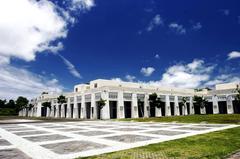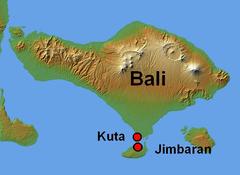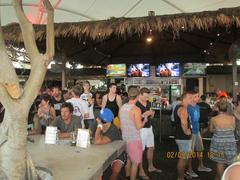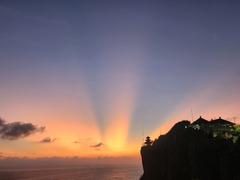Complete Guide to Politeknik Negeri Bali Visiting Hours, Tickets, and Nearby Attractions
Date: 14/06/2025
Introduction
Politeknik Negeri Bali (PNB) is a leading institution for vocational education in Bali, Indonesia. Established in 1987 as part of Universitas Udayana and gaining independence in 1997, PNB has become a hub for practical, industry-oriented learning tailored to Bali’s economic and cultural context. Located in Bukit Jimbaran, South Kuta, the campus offers modern facilities, strong links to local industries, and easy access to some of Bali’s most popular tourist attractions. This guide details PNB’s history, academic offerings, campus facilities, visiting information, and nearby points of interest, serving prospective students, visitors, and travelers interested in Bali’s educational landscape. For the latest updates, please refer to official and affiliated sources (universitas.beelajar.com, remajakampus.com, ApaBuka.com).
Table of Contents
- Introduction
- Early Foundations of Polytechnic Education in Indonesia
- The Emergence of Politeknik Negeri Bali
- Transition to Independence and Official Establishment
- Growth and Expansion of Academic Programs
- Mission, Vision, and Societal Role
- Location, Campus Development, and Visitor Information
- Governance, Accreditation, and Quality Assurance
- Legacy and Continuing Impact
- Frequently Asked Questions (FAQ)
- Call to Action
Early Foundations of Polytechnic Education in Indonesia
The polytechnic system in Indonesia began in 1976 through a collaboration between the Bandung Institute of Technology (ITB) and the Swiss government, launching the country’s first polytechnic. Following its success, Indonesia expanded this model to several other locations, aiming to supply the nation’s growing industries with skilled technical professionals. These institutions emphasized a blend of theoretical and practical education to drive Indonesia’s industrial and economic development (universitas.beelajar.com).
The Emergence of Politeknik Negeri Bali
PNB was established as part of this nationwide educational initiative. In 1984, the Indonesian government created Politeknik Universitas Udayana in Bali, initially offering Mechanical Engineering, Electrical Engineering, and Accounting. The first academic session began on October 5, 1987, under the leadership of Ir. Ketut Kinog and Drs. Abdullah Jawas, laying the foundation for a high-quality vocational education institution (remajakampus.com, universitas.beelajar.com).
Transition to Independence and Official Establishment
In the 1990s, policy reforms mandated greater autonomy for polytechnics. Preparations for PNB’s independence began in 1994, culminating in its official establishment as Politeknik Negeri Bali on April 28, 1997, via Ministerial Decree No. 081/O/1997. The formal inauguration took place on September 12, 1997, marking PNB’s transformation into a standalone institution, better equipped to respond to market needs and technological change (universitas.beelajar.com).
Growth and Expansion of Academic Programs
Since independence, PNB has expanded from three departments to nine, with three Diploma 4 (D4) programs as of 2025. The curriculum is designed to adapt to the changing needs of industry and society, emphasizing applied sciences, engineering, business, and tourism—fields integral to Bali’s economy (remajakampus.com). The institution abides by Indonesia’s National Education System Law No. 12 of 2012, focusing on practical skills and robust theoretical foundations (universitas.beelajar.com).
Mission, Vision, and Societal Role
PNB’s mission encompasses education, research, and community service. The polytechnic aims to produce professional, globally competitive graduates, particularly to meet the demands of Bali’s vibrant tourism and service sectors. Research and social services focus on science, technology, and the arts, with the vision of becoming a leading vocational higher education institution by 2025 (universitas.beelajar.com, remajakampus.com).
Location, Campus Development, and Visitor Information
PNB is located at Jl. Raya Kampus Jimbaran, Badung, Bali 80361, Indonesia (remajakampus.com). Its strategic position near major tourism centers and the international airport allows for strong industry partnerships and ample practical training opportunities for students.
- Visiting Hours: Monday–Friday, 8:00 AM–4:00 PM
- Entry Fee: Free, though some workshops or events may require registration
- Visitor Tips: Schedule appointments in advance via the official website. Guided tours can be arranged for groups or academic visitors.
Nearby attractions include Jimbaran Bay (famous for seafood and sunsets) and Uluwatu Temple, both easily accessible from the campus.
Governance, Accreditation, and Quality Assurance
PNB is governed by the Indonesian Ministry of Education, Culture, Research, and Technology. Regular accreditation ensures programs meet national and international standards, maintaining PNB’s reputation as a leading polytechnic (universitas.beelajar.com).
Legacy and Continuing Impact
PNB has been instrumental in developing Bali’s workforce, particularly in tourism, hospitality, business, and engineering. Its focus on innovation, community engagement, and industry collaboration keeps it at the forefront of vocational education in Indonesia (universitas.beelajar.com).
Frequently Asked Questions (FAQ)
Q: What are the visiting hours for Politeknik Negeri Bali?
A: Monday–Friday, 8:00 AM–4:00 PM. Appointments are recommended.
Q: Is there an entry fee?
A: No, campus entry is free. Some events may require registration.
Q: What programs are available?
A: Nine departments and three D4 programs in applied sciences, engineering, business, and tourism.
Q: Where is PNB located?
A: Jl. Raya Kampus Jimbaran, South Kuta, Badung Regency, Bali 80361, Indonesia.
Q: What attractions are nearby?
A: Jimbaran Bay beach and Uluwatu Temple.
Call to Action
For detailed program information and to arrange a visit, check the official PNB website or their social media channels. Download the Audiala app for campus updates, event notifications, and additional educational resources. Enhance your experience by exploring related articles on vocational education in Bali and Indonesia.
Visiting Bajra Sandhi Monument: Hours, Tickets, and Travel Tips for Bali’s Iconic Historical Site
Introduction
The Bajra Sandhi Monument in Denpasar, Bali, is a striking symbol of the Balinese people’s fight for independence. This architectural marvel offers visitors an immersive experience of Bali’s history and culture, featuring dioramas, exhibitions, and panoramic views. This section provides practical guidance on visiting hours, ticketing, cultural highlights, nearby attractions, accessibility, and travel tips.
History and Cultural Significance
Inaugurated in 1987, the monument is inspired by the Balinese ‘Bajra’ bell and represents the Hindu philosophy of Tri Hita Karana—harmony among humans, nature, and the spiritual realm. Its dioramas narrate Bali’s historical journey, and the monument serves as a venue for cultural exhibitions and performances.
Visiting Hours and Ticket Information
- Opening Hours: Daily, 8:00 AM–6:00 PM
- Ticket Prices:
- Domestic Visitors: IDR 5,000–15,000
- Foreign Tourists: IDR 15,000–30,000
- Children under 12: Free
- Tickets: Available onsite and online. Group discounts and guided tours on request.
Travel Tips and Accessibility
- Best Time: Early morning or late afternoon for comfort and fewer crowds.
- Accessibility: Ramps and elevators are provided.
- Guided Tours: Offered in English and Indonesian; book ahead for availability.
- Photography: Permitted throughout; professional shoots require prior consent.
Nearby Attractions
- Renon Park: Ideal for leisurely walks and picnics.
- Puputan Badung Square: A historical site commemorating resistance to colonialism.
- Bali Museum: Showcasing the island’s art and history.
Special Events and Media
Cultural festivals, traditional performances, and educational workshops are regularly held. Virtual tours and multimedia displays enhance the visitor experience—check the official website for schedules.
Visitor Tips
- Dress Code: Modest clothing is recommended.
- Facilities: Restrooms, souvenir shop, and café available.
- Parking: Free onsite parking.
Frequently Asked Questions (FAQ)
Q: Are group discounts available? A: Yes, for groups and students with valid ID.
Q: Is the monument family-friendly? A: Absolutely; children benefit from engaging, educational exhibits.
Q: Can I bring food inside? A: Outside food is not permitted, but refreshments are sold onsite.
Q: Is the site accessible? A: Yes, with ramps and elevators.
Conclusion
A visit to Bajra Sandhi Monument is a must for anyone interested in Balinese history and culture. Its accessible location, informative exhibits, and vibrant events offer a memorable experience for all ages.
For more, visit the official Denpasar tourism website, Bajra Sandhi Monument’s page, and official Bajra Sandhi Monument website.
Practical Guide to Visiting Politeknik Negeri Bali
Campus Location and Accessibility
PNB is at Jl. Raya Kampus Bukit Jimbaran, Kuta Selatan, Badung, Bali 80364, Indonesia, just 10 km from Ngurah Rai International Airport—a 20–30 minute drive. The campus is accessible by private car, taxi, motorbike rental, and ride-hailing apps such as Gojek and Grab. Ample parking is available for cars and motorbikes (ApaBuka.com).
Visiting Hours and Entry Fees
- Hours: Monday–Friday, 08:00–16:00
- Entry: Free. Some events or guided tours may have a fee (ApaBuka.com).
Campus Facilities
- Academic Buildings: Modern lecture halls, labs, and computer rooms.
- Library: Focused on tourism, engineering, business, and IT.
- Cafeterias: Affordable food options with local cuisine.
- Green Spaces: Landscaped gardens for relaxation.
- Event Spaces: Venues for public lectures and cultural events.
Unique Experiences
Capture photos of Balinese architecture, gardens, and event spaces. Attend student exhibitions or public seminars to experience Balinese culture and sustainability initiatives.
Guided Tours and Cultural Activities
Guided campus tours are available for prospective students and groups—arrange in advance via PNB Official Website or call +62 361 701981. Public lectures, student exhibitions, and cultural performances are frequently held, especially by the Tourism Department (IJASTE Journal).
Visitor Tips
- Dress: Smart casual; more formal attire for official events.
- Language: Indonesian is primary; English widely understood in tourism/business faculties.
- Accessibility: Ramps and elevators in main buildings.
- Safety: Security personnel on site; sign in at the entrance.
- Best Time: Dry season (April–October) and weekdays during the term for the most vibrant campus atmosphere.
Nearby Attractions
- Jimbaran Beach: White sands and seafood dining (Atlantis Press).
- Kedonganan Fish Market: Local seafood culture.
- Uluwatu Temple: Clifftop temple and Kecak dance (PNB Research PDF).
- Kuta and Legian: Shopping, surfing, and nightlife.
Events and Academic Calendar
- Academic Year: August–July, with breaks in January–February and July–August.
- Open Days: Before the academic year; tours and program info.
- Student Festivals and Conferences: Focused on Balinese arts, business, engineering (PNB PMB).
For updated schedules, see the academic calendar or contact administration.
FAQs
Q: Are guided tours available? A: Yes; arrange via +62 361 701981 or www.pnb.ac.id.
Q: Is the campus accessible? A: Main buildings have ramps and elevators.
Q: Can I take photographs? A: Yes, except in restricted areas.
Q: Are COVID-19 guidelines in effect? A: Check the official website for the latest protocols.
Additional Resources
Contact Information
- Phone: +62 361 701981
- Website: www.pnb.ac.id
- Address: Jl. Raya Kampus Bukit Jimbaran, Kuta Selatan, Badung, Bali 80364, Indonesia
Visitor Reviews
PNB consistently receives high ratings for its clean environment, welcoming staff, and commitment to sustainable tourism and community engagement (ApaBuka.com). For the best experience, visit during academic terms and combine your tour with trips to nearby beaches and cultural sites.
Summary and Recommendations
Politeknik Negeri Bali is a pillar of vocational education in Bali, offering modern facilities, a dynamic campus atmosphere, and strategic access to some of the island’s top attractions. Its role in workforce development, particularly in tourism, engineering, and business, underscores its impact on Bali’s economic growth. Visitors are encouraged to participate in campus tours, cultural events, and public seminars to gain deeper insight into Indonesia’s vocational education sector. For detailed information, consult official resources and stay connected via digital platforms (universitas.beelajar.com, remajakampus.com, ApaBuka.com).
Download the Audiala app and follow PNB’s digital channels to enrich your visit and stay updated on events and opportunities.



